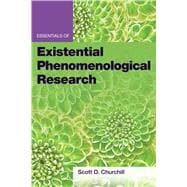The brief, practical texts in the Essentials of Qualitative Methods series introduce social science and psychology researchers to key approaches to qualitative methods, offering exciting opportunities to gather in-depth qualitative data and to develop rich and useful findings.
In this book, Scott D. Churchill introduces readers to existential phenomenological research, an approach that seeks an in-depth, embodied understanding of subjective human existence that reflects a person's values, purposes, ideals, intentions, emotions, and relationships. This method helps researchers understand the lives and needs of others by helping identify and set aside theoretical and ideological prejudgments.
About the Essentials of Qualitative Methods book series: Even for experienced researchers, selecting and correctly applying the right method can be challenging. In this groundbreaking series, leading experts in qualitative methods provide clear, crisp, and comprehensive descriptions of their approach, including its methodological integrity, and its benefits and limitations. Each book includes numerous examples to enable readers to quickly and thoroughly grasp how to leverage these valuable methods.








